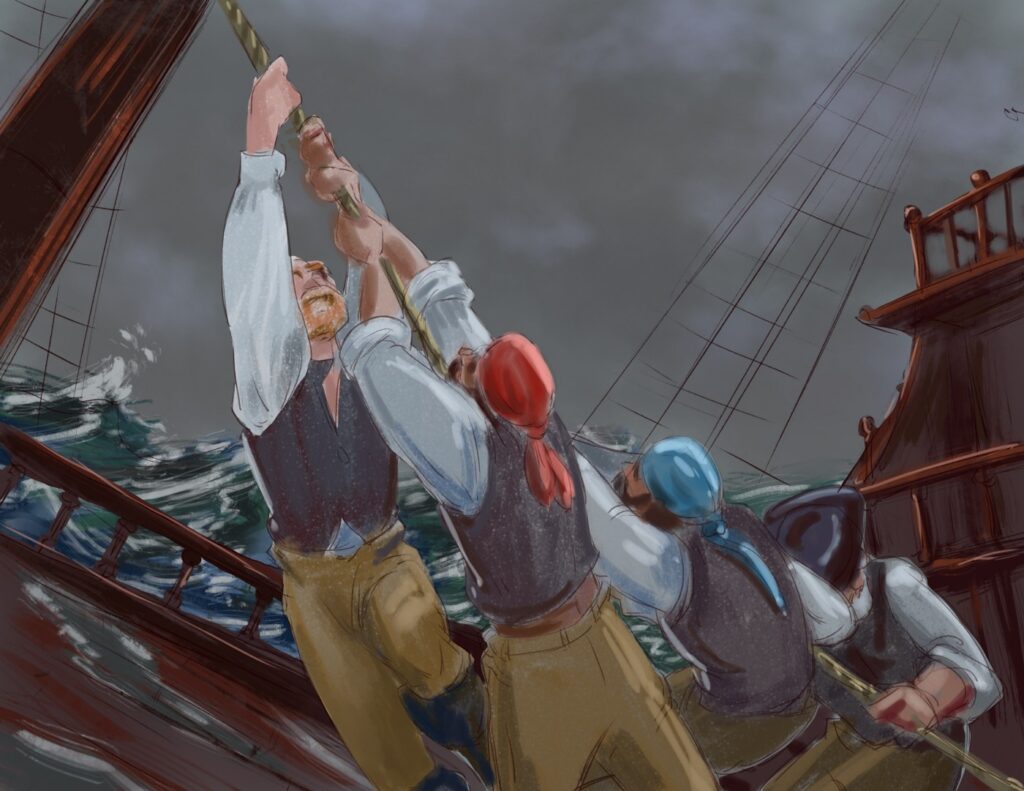Part 2 of 3: Adjusting Your Sails to Navigate Today’s Choppy Waters

A captain is only as effective as her or his crew.
It’s a lesson I’ve learned time and again in my career, through making the mistake of trying to go it alone. In a crisis like this one, you need a solid crew more than ever, not just to run a tight ship, but to keep you — the captain — on course.
In my last post, I shared five strategic insights from previous downturns and turnarounds. In this one, I’ll share my thoughts on how to pick the best crew, how to communicate with them effectively, and how to empower them to do their best.
Because no matter how good your strategy, your ability to navigate these perilous straits is contingent on the kind of crew you bring with you, and how you mold those talented individuals into a dynamic team capable of adapting to uncharted waters that lie ahead.
A Happy Crew Makes a Happy Ship
Taking care of your crew starts with taking care of yourself. In my twenty years as an operator, I have burnt out more times than I care to admit. Figure out your own recipe for staying sharp. For me, I’ve learned it means getting sleep, making time for regular exercise and meditation, eating nutritious food, and limiting alcohol consumption. You’ve got to put your own oxygen mask on first before helping others.
Now more than ever, make empathy an everyday practice when communicating with your team. Show your humanity by being vulnerable and sharing your own feelings and struggles. Embrace our shared new reality; introduce kids, partners, and pets when they appear in a Zoom call. Out of habit, I keep a list of team members and make sure I informally connect with them, whether it’s a quick text, a Slack message, or an extra heap of gratitude. If you can afford it, allocate for a well-being budget, and offer flexibility on when and how the work gets done.
Inevitably during this crisis, you will find yourself in the position of having to deliver difficult news. As anxieties run high, it’s tempting to soften bad news or sugarcoat the severity of obstacles. When it comes to delivering difficult news, candour is key. We’ve seen examples of exceptional leadership in the face of difficult decisions. In the past few weeks, Brian Chesky (AirBnB) and Henry Ward (Carta) have shown the utmost respect and empathy for their employees by being direct and compassionate and accepting personal responsibility even while laying off employees.
Remember, when this crisis is over, you will need to hire sailors once again. You want your ship to have a good reputation. In the words of author Simon Sinek, you should play The Infinite Game. How you deal with this crisis will determine your reputation and your ability to bounce back in the long run.
Rallying Your Crew
Executing your new growth plan means getting everyone on the same page. And in a crisis, you need to communicate three times more than normal. At Google, Jonathan Rosenberg liked to say, “repetition doesn’t spoil the prayer.” There is no such thing as over-communication. When you’ve repeated something over and over and over again so many times that you’re sick of listening to yourself, you’re probably halfway there.
When it comes to managing your team, listening is even more important than giving clear direction. Whenever I start a new role, I ask three simple questions of everyone on the team: 1) What’s working 2) What could be improved? 3) If you were me, what’s one thing that you would do or change?
I am always amazed that the path forward is usually hidden in plain sight — if I remember to stop, ask, and truly listen. And this listening should never stop. Find creative ways to keep checking in with your team and soliciting feedback — through Slack channels, town halls with unfiltered Q&A, AMAs, or virtual whiteboard sessions.
This crisis is a chance to (re)connect your team to your purpose. Spotlighting customer stories can remind your crew that the journey is worth it. At Evernote, we told stories about one customer who used our product to write a book on running a marathon — while running an ultra-marathon across a desert. Another client, a cancer lab, used our product to improve how they developed life-saving drugs. Yet another customer, an individual with dementia, used Evernote as a literal extension of his brain and memory. A captain needs to translate the dream and keep it alive, especially in hard times.
“If you want to build a ship, don’t drum up the men to gather wood, divide the work, and give orders. Instead, teach them to yearn for the vast and endless sea.” — Antoine de Saint Exupery
Leveling Up Your Mates
Crises have a way of revealing whose bunk is or isn’t shipshape. There never really is a tolerance for under-performers, but in turbulent times, every team member needs to deliver at a consistently high level. That’s why it’s critical to objectively assess performance. At the same time, you have to allow for a culture where developmental feedback is fluid and natural. Kim Scott, my CEO coach, has a great chapter on this topic in her book Radical Candor.
Look for creative ways to develop your crew, by doubling down on training for your top salespeople, or by investing in better tools and augmenting existing platforms to make connectivity work better and faster at scale. Selectively topgrading talent by adding or promoting A+ talent can be inspiring to your team; it shows them you have the commitment and confidence to make it through. With today’s remote workplace, you now have access to the best talent all around the world. Those captains willing to embrace dual modalities — defence and offence — tend to emerge from storms with more wind in their sails.
Choose Partners Carefully
Your careful consideration in choosing your crew should extend to partners as well. Your partners are people who will be along for the journey through all types of conditions. Screen for partners that share your vision and assessment of current reality, the strengths and weaknesses of your business. Obviously, pivots and changes in direction will require robust debate. But ongoing, fundamental disagreements will lead to awkward conversations and waste energy at the worst possible time.
You need to screen out fair-weather sailors. Do your homework and gather multiple references. If you want to know what a partner is really like, then talk to founders and CEOs that sailed with them in stormy weather. How did they react when things went sideways? Now, more than ever, is the time to live by the “No Asshole Rule.”
Once you choose your partners, you need to make sure you are bringing all your stakeholders along for the voyage. This is something I really struggled with at times, especially in exhausting turnaround situations. It’s easy to forge ahead without taking the time to clearly communicate to everyone what choices you’re making, and why. Communicate with all of your stakeholders — inside and outside of the company — so they too can buy into your vision for the future.
Weathering this storm requires a steady hand on the wheel and a resilient crew with an endless reservoir of true grit to stick to a vision. If you’re on a mission that matters, then it is worth persisting through the storm.
We empower and invest in visionary financial entrepreneurs. Learn more about Portag3 Ventures at p3vc.com.


